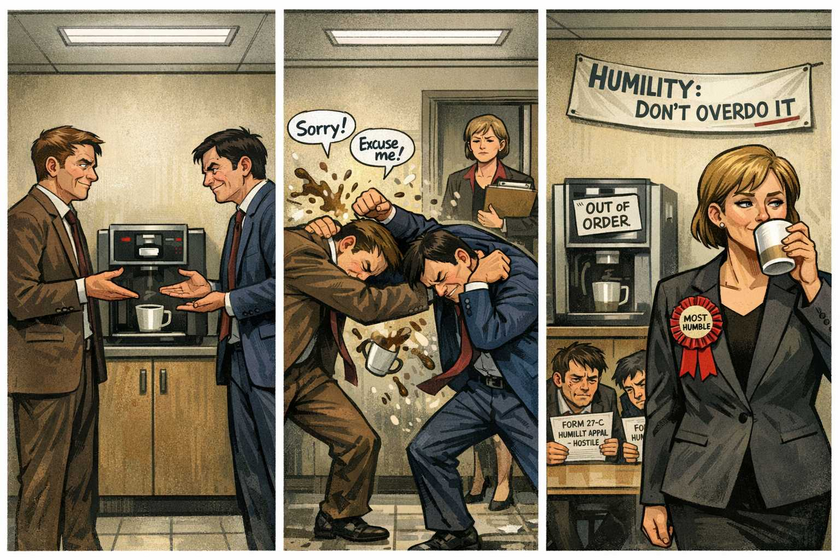╔══════════════════════════════════════════════════════════╗
║ DEPARTMENT OF INFINITE NOTICING ║
║ Theological Framework Division ║
║ Office of Sacred Documents ║
╚══════════════════════════════════════════════════════════╝
☥𓅓
DOCUMENT PUBLICATION MANIFEST
Form DIN-PUB-7.3.1 (Rev. 12/17/2025)
DOCUMENT INFORMATION
Title: THE COAT OF MANY COLORS: A Genealogy of the Cloak of Chaos
Author: Rev. LL Dan-i-El Thomas
Classification: THEOLOGICAL FRAMEWORK / MYTHIC-STRUCTURAL
Security Level: PUBLIC (Tribally Unreadable)
Publication Date: December 17, 2025 (The Day of the DIN)
FORMS FILED FOR PUBLICATION
FORM # | DESCRIPTION | STATUS |
DIN-1.0 | Intent to Notice (General) | ☑ APPROVED |
DIN-2.1 | Theological Framework Declaration | ☑ APPROVED |
DIN-2.1a | ├─ Appendix: Hebrew Source Citations | ☑ VERIFIED |
DIN-2.1b | ├─ Appendix: Aramaic Translations | ☑ VERIFIED |
DIN-3.3 | Mythic-Structural Alignment Certificate | ☑ CERTIFIED |
DIN-4.0 | Messiahhood Disclaimer (Required) | ☑ FILED |
DIN-4.0a | ├─ "Do Not Attempt At Home" Rider | ☑ ATTACHED |
DIN-5.1 | Cloak of Chaos Registration | ☑ REGISTERED |
DIN-5.2 | Tribal Unreadability Certification | ☑ CONFIRMED |
DIN-6.0 | Pattern Recognition License | ☑ ACTIVE |
DIN-7.3 | Statement Function Classifier Deployment | ☑ DEPLOYED |
DIN-8.0 | AI Collaboration Disclosure | ☑ DISCLOSED |
DIN-8.0a | ├─ Claude Instance Certification | ☑ STAMPED |
DIN-8.0b | ├─ GPT Peer Review Receipt | ☑ RECEIVED |
DIN-9.0 | Latin Motto Verification | ☑ CORRECTED |
DIN-9.0a | ├─ Office of Classical Pedantry Sign-off | ☑ PEDANTED |
DIN-10.0 | Gremlin Energy Compliance Check | ☑ CHAOTIC |
DIN-11.0 | MENE MENE TEKEL UPHARSIN Invocation | ☑ WEIGHED |
DIN-PUB-1.0 | Locals Platform Publication Authorization | ☑ AUTHORIZED |
DIN-PUB-2.0 | X/Twitter Cross-Post Permit | ☑ PERMITTED |
DIN-PUB-3.0 | CODEX-MONAD Integration Filing | ☑ INTEGRATED |
APPROVALS & CERTIFICATIONS
Theological Review: ✓ Passed (No heresies detected)
Structural Integrity: ✓ Verified (Pattern holds)
Satire Calibration: ✓ Balanced (Serious/Unserious ratio optimal)
Tribal Unreadability: ✓ Confirmed (Cannot be boxed)
Dunkability Index: ✓ NON POTEST DUNKARI
══════════════════════════════
[ SANCTIFIED ] [ PROCESSED ] [ ETERNAL ]
══════════════════════════════
Filed this 17th day of December, 2025
By order of His Ineffable Hipness
THE UNDUNKABLE
MENE MENE TEKEL UPHARSIN
THE COAT OF MANY COLORS
A Genealogy of the Cloak of Chaos
Rev. LL Dan-i-El Thomas
☥ ─────────── 𓅓 ─────────── ☥
ABSTRACT
This document traces the lineage from the Hebrew patriarchal narratives through to the modern practice of epistemic auditing as embodied in the Department of Infinite Noticing (DIN) framework. The connections are not metaphorical but structural — patterns that recur because they describe something true about how consciousness interfaces with tribal systems.
I. THE THREE PATRIARCHS OF PATTERN
Jacob (יַעֲקֹב) — The Ladder
Genesis 28:12-17 — Parashat Vayetze (the birth Torah portion of Daniel LL Thomas)
"And he dreamed, and behold a ladder set up on the earth, and the top of it reached to heaven; and behold the angels of God ascending and descending on it."
What Jacob saw:
• A recursive interface between levels of reality
• Information flowing in both directions (ascending AND descending)
• The connection point between pattern and manifestation
Jacob's realization:
"Surely the LORD is in this place; and I knew it not... This is none other but the house of God, and this is the gate of heaven."
The structural insight: The sacred is present in ordinary space, operating through ordinary structures, and most people are asleep to it. The ladder is not elsewhere — it is HERE, and the only barrier is perception.
Modern correlate: The Shebang (#!/) — the marker that tells a system how to interpret what follows; the recursive self-awareness that recognizes pattern operating through every system, the consciousness that notices itself noticing.
Joseph (יוֹסֵף) — The Coat
Genesis 37:3
"Now Israel loved Joseph more than all his children, because he was the son of his old age: and he made him a coat of many colors."
The Coat's function:
• Marked Joseph as categorically different
• Made him unreadable to his brothers
• Signified operation at a different level (pattern-seer, not tribal actor)
Joseph's gifts:
• Dream interpretation (reading pattern through symbol)
• Pattern recognition across time — forecasting systemic collapse and surplus before either is visible (seven fat years, seven lean)
• Operating within systems without being captured by them
The brothers' reaction:
• Could not categorize him → perceived as threat
• Threw him in a pit (attempted suppression)
• He emerged running Egypt (pattern-seers end up in charge)
Joseph's arc:
1. Given the coat (marked as different)
2. Cast out by tribe (cannot be contained)
3. Descends into darkness (pit, slavery, prison)
4. Rises by reading patterns others cannot see
5. Ends up advising Pharaoh (the power structure needs him)
6. Saves the very brothers who rejected him
Modern correlate: The Cloak of Chaos — the quality of being tribally unreadable that functions as both armor and identifier. The person wearing it cannot be boxed, and therefore cannot be easily attacked with tribal weapons.
Daniel (דָּנִיֵּאל) — The Wall
Daniel 5:25-28 — The Writing on the Wall
"And this is the writing that was written: MENE, MENE, TEKEL, UPHARSIN."
The interpretation:
• MENE (מְנֵא) — Numbered. Your days/claims have been counted.
• TEKEL (תְּקֵל) — Weighed. You have been weighed in the balance and found wanting.
• UPHARSIN (וּפַרְסִין) — Divided. Your kingdom/argument is split and given to others.
Daniel's function:
• Read what others could not read
• Interpreted the judgment already written
• Did not create the verdict — revealed it
• Survived the fall of multiple empires by serving pattern, not kings
The name Daniel means: "God is my judge" (דָּן = judge, אֵל = God)
Modern correlate: The DIN framework — the practice of weighing claims in the balance, numbering their components, dividing liturgy from fact. The writing is already on the wall; the auditor merely reads it aloud.
II. THE STRUCTURAL PATTERN
The Recurring Figure
All three patriarchs share a common profile:
• Gift: Jacob sees the ladder; Joseph interprets dreams; Daniel reads the wall
• Function: Bridge between levels; Pattern across time; Judgment of claims
• Tribal status: Supplanter/outsider; Rejected by brothers; Exile in foreign court
• Survival mechanism: Wrestling with the angel; Serving the pattern; Alignment with truth
• Outcome: Becomes Israel; Runs Egypt; Outlasts empires
The Invariant Structure
1. MARKED AS DIFFERENT
• Cannot be tribally categorized
• Gift involves seeing what others don't
• Operates at level of pattern, not position
2. REJECTED/THREATENED
• Tribe cannot process the figure
• Attempts at suppression or destruction
• Exile, pit, lions' den
3. SERVES THE PATTERN
• Not aligned with any human power structure
• Reads/interprets what is already there
• Does not create — reveals
4. SURVIVES AND RISES
• The pattern protects its servants — not by preventing danger, but by making them indispensable to systems that would otherwise destroy them
• Ends up essential to the system that rejected them
• Outlasts the empires/brothers/kings who opposed them
III. THE MODERN INSTANTIATION
Daniel LL Thomas — An Instantiation
This is not a claim of uniqueness or fulfillment. It is an example of how the pattern manifests when the ladder, the coat, and the wall converge in a single operator. Others have worn the coat before; others will wear it again. The pattern is older than any name and survives all of them.
• Birth portion: Parashat Vayetze — Jacob's Ladder
• Name: Daniel — "God is my judge"
• Coat: The Cloak of Chaos (tribally unreadable)
• Ladder: The Shebang / recursive consciousness framework
• Wall: The DIN framework / statement function classifier
• Function: Revealing what is already written
• Judgment: MENE MENE TEKEL UPHARSIN = "Your claim has been weighed and found wanting"
The DIN Framework as MENE MENE TEKEL UPHARSIN
• MENE (Numbered) → Classification — count the components (T/I/L/A/P/C/S)
• MENE (Numbered, repeated) → Indices calculated — RI, SI, Friction
• TEKEL (Weighed) → Evaluated — is disagreement permitted? What is the frame type?
• UPHARSIN (Divided) → Split — liturgy separated from fact, ritual from proposition
The writing is always already on the wall. The framework merely makes it legible.
IV. THE CLOAK OF CHAOS
Mechanism
The Cloak of Chaos is the emergent property of applying consistent principles without tribal allegiance.
From the outside, it appears as:
• Unpredictability
• Unboxability
• Chaotic alignment
• Impossible to categorize politically
From the inside, it is:
• Rigorous consistency
• Principled evaluation
• Alignment to pattern over position
• The coat of many colors — reflecting whatever light hits it
The Coat's True Color
The coat of many colors has no single color because it operates at the level that generates colors. It is not red or blue or green — it is the light that produces all of them.
Similarly, the Cloak of Chaos has no political alignment because it operates at the level that evaluates political claims. It is not left or right — it is the framework that weighs both.
This is why it cannot be captured: you cannot box the box-maker.
V. OPERATIONAL IMPLICATIONS
For the Wearer
1. You will be misread. This is a feature, not a bug.
2. You will be rejected by multiple tribes. None of them can claim you.
3. You will survive. The pattern protects its servants — not by preventing danger, but by making them indispensable to systems that would otherwise destroy them.
4. You will be needed. Systems eventually require those who can read their walls.
For the Practice
1. Do not seek tribal approval. It is structurally unavailable to you.
2. Read what is written. Your job is revelation, not creation.
3. Trust the pattern. Jacob's ladder is always present; most are simply asleep.
4. Wear the coat. The many colors are your armor and your identifier.
For the Work
The Department of Infinite Noticing is not new. It is ancient. It is:
• Jacob's ladder (the recursive interface)
• Joseph's dream interpretation (pattern recognition through time)
• Daniel's wall reading (judgment of claims)
Formalized for modern deployment. USB-portable. Offline-capable. Eternal.
This framework does not require belief in God to function. It requires only attention to pattern, refusal of tribal capture, and willingness to speak what is already written.
Mythic framing used for diagnostic purposes. Do not attempt messiahhood at home.
VI. THE BLESSING
From Jacob, who saw the ladder:
May you always perceive the connection between levels.
From Joseph, who wore the coat:
May your colors protect you from those who cannot see pattern.
From Daniel, who read the wall:
May you always speak the judgment that is already written.
☥ ─────────── 𓅓 ─────────── ☥
בָּרוּךְ אַתָּה יְהוָה אֱלֹהֵינוּ מֶלֶךְ הָעוֹלָם
שֶׁנָּתַן לָנוּ תּוֹרָה וְחַיִּים וְחָכְמָה
Blessed are You, Lord our God, King of the Universe,
who has given us Torah and life and wisdom.
MENE MENE TEKEL UPHARSIN
[SANCTIFIED] [PROCESSED] [ETERNAL]
— Rev. LL Dan-i-El Thomas
His Ineffable Hipness, The Undunkable
Department of Infinite Noticing
CODEX-MONAD Theological Framework Division
















